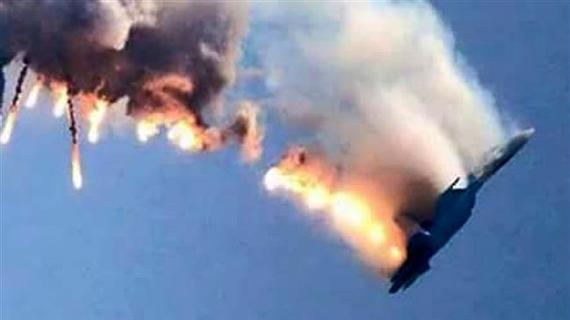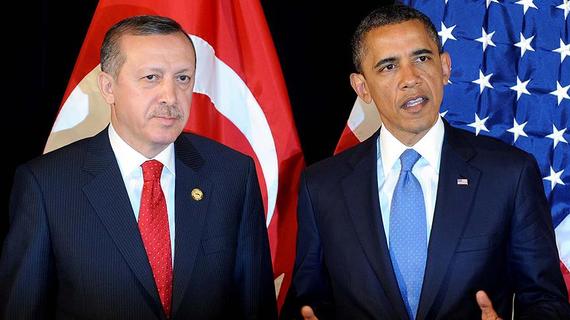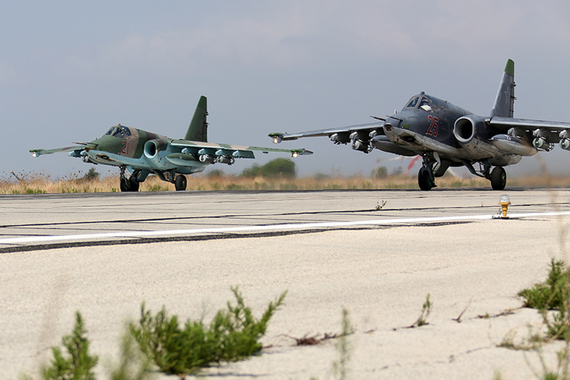 Russian SU-24 jet disintegrates in midair after being struck by a Sidewinder missile from a Turkish F-16 fighter. Photo courtesy Iran Press TV
Russian SU-24 jet disintegrates in midair after being struck by a Sidewinder missile from a Turkish F-16 fighter. Photo courtesy Iran Press TV
On November 24, 2015, A Turkish F-16 fighter used a sidewinder air to air missile to shoot down a Russian SU-24 fighter bomber for straying into Turkish airspace over Hatay province. The pilot, Lt. Col. Oleg Peshkov and his navigator, Capt. Konstantin Murakhtin, both successfully jettisoned from the aircraft. Peshkov was subsequently shot dead by Syrian Turkoman rebels as he parachuted to earth while Murakhtin was eventually rescued by Syrian and Russian Special Forces. A second Russian, Alexander Pozynich, a member of a naval marine unit, was also killed when a Mi-8 rescue helicopter was hit by an American made TOW anti-tank missile from an unspecified Syrian rebel group and destroyed.
The Russian navigator subsequently claimed that they had been in Syrian air space and that in any case they had not received any warnings from Turkish air control authorities that they had strayed into Turkish air space. The Turkish government, in response, produced a tape of communications with the Russian aircraft showing that they had been warned on ten separate occasions that they had crossed into Turkish air space and that they would be fired upon.
American fighter pilots shadowing the Russian plane also confirmed that the Russian aircraft had been warned by Turkish authorities. Both countries released radar tracks of the SU-24 that appeared to support their positions. In response to the incident, Russian announced that it was deploying surface to air missiles in Syria and demanded that sanctions be placed on Turkey for an attack that Russian president Vladimir Putin described as "a planned provocation" and "a stab in the back".
Western media described the incident as the result of continued Russian provocation of Turkey. The incident being only the latest example of repeated Russian violations of Turkish air space. To add insult to injury the Russian jet was attacking a group of Turkoman Syrian rebels that had been organized and armed by Turkey.
On the other hand, during the cold war it was common for both the Soviet Union and the United States to probe each other's air space in order to ascertain both the state of their opponent's readiness and gauge their responses. i.e., what planes would they scramble, from which bases, what radar controlled surface to air missile batteries would be activated. In the vast majority of instances the offending plane would be escorted out of that country's air space and the matter would be closed. The last time the Soviet Union shot down a plane for violating its airspace was in 1973. In that case it was an Iranian plane operating under CIA auspices as part of a surveillance project called Dark Gene.
After the end of the Cold War, the practice of probing each side's air defense systems stopped. In recent years Russia has restarted the practice and routinely violates the air space of many countries in Eastern Europe, especially the Baltic States, as well as those of the Scandinavian countries and NATO members, particularly Great Britain and the arctic regions of Canada and the United States.
It is clear that the violation of Turkish air space was no accident. It's possible that a fighter plane engaged in air combat could inadvertently stray into a neighboring country's air space. The Russian plane in question was not engaged in air combat nor was it under fire. Russian pilots are highly trained professionals. They do not accidently violate another country's air space unless they have had a serious navigational malfunction or they are ordered to deliberately do so.
So what exactly is happening here? Is Russia trying to intimidate Turkey by repeatedly violating its airspace and if so to what end? Was the Turkish response an overreaction? Should the Turkish response have been more calibrated? Turkish fighter pilots are also highly trained professionals. They do not open fire on a Russian plane, even if it is in Turkish air space, without being given direct orders to do so. In fact, it was in both Erdogan's and Putin's interest to stage such an incident. While there is a logic to their actions, it is also a very dangerous game, one that could very easily spin out of control with deadly consequences.
What Turkey fears most is that the United States and Russia could come to an agreement over the future of Syria that would marginalize Turkey's role. Such an agreement would very likely include the continuation of the Assad regime, a government that Ankara is committed to overturning, as well as, to Ankara's horror, some sort of semi-Autonomous Kurdish state in northern Syria. Russia's Putin has already signaled that he would be in favor of such a state as part of a looser, federal structure in Syria that would grant significant autonomy to the Kurds and possibly other Syrian minority groups.
By shooting down a Russian plane, Erdogan creates a situation where the rest of NATO and especially the United States are forced to support Turkey's action. Otherwise, NATO's credibility would be called into question. By pulling both NATO and especially the United States into the dispute on Turkey's side, even if it is only a halfhearted support, Erdogan makes it more difficult for the United States and Russia to find a common ground. Stoking Turkish nationalism and mobilizing his political base doesn't hurt either, especially now that Erdogan is looking to change the Turkish constitution to significantly expand the powers of the presidency.
Conversely, by provoking Turkey, Vladimir Putin also got exactly what he wanted, a crisis, of sorts, in NATO. On the one hand many of Europe's core NATO members do not want another confrontation with Russia right now. The existing sanctions on Russia over the seizure of the Crimea already come at a significant economic cost to Europe. The EU's biggest challenge at the moment is dealing with the never ending stream of refuges overwhelming Europe. In the absence of any American leadership, the EU is hoping that Russia can bring some semblance of stability to Syria and cutoff the deluge of refugees.
On the other hand, the East European members of NATO and especially the Baltic Republics, who only recently won their independence from the detritus of the Soviet state, who are subject to unrelenting Russian pressure, including frequent violations of their airspace, are extremely concerned in how NATO responds to the Turkish incident. A less than committed response will raise concerns that NATO's defense guarantees may not be worth much in resisting Russian aggression.
So far NATO's response has been very measured, calling for "calm and de-escalation" while reaffirming their support for Turkey. U.S. Secretary of State has called for calm. German Foreign Minister Frank Walter Steinmeier has done the same, calling on both Moscow and Ankara "to show prudence and common sense" British Prime Minister David Cameron has confirmed that Turkey, just like Great Britain, "has a right to protect its air space". Privately, however one high ranking NATO diplomat commented that "there were other ways of dealing with these kinds of incidents". France, which is looking for concerted action against the Islamic State and suspects Turkey or providing covert assistance to IS, has been relatively quiet. French President Francois Holland urged that "we must prevent escalation" and that "the only purpose is to fight against terrorism and Daesh". In the capitals of Eastern Europe the situation is being monitored closely and concern is rising.
What comes next is anybody's guess. The Russians have announced that they will deploy surface to air missiles in Syria. They were probably always planning to do so, but the incident with Turkey gives them a handy pretext to do so. It's unclear how this changes things since the Syrian's already have SAM batteries in operation. Moscow has announced the imposition of economic sanctions on Turkey. They have also stepped up their criticisms that the Turkish government and especially, the Turkish Intelligence Agency, MIT, is directly involved in aiding Islamic State militants and other anti-Assad jihadists by brokering everything from oil to smuggled antiquities and allowing free passage for militants going to Syria. It's estimated that over the last three years over 20,000 militants have gone to Syria to fight against the Assad government with the vast majority of them travelling through Turkey.
What happens the next time Turkish planes violate Syrian air space. What happens if a Turkish plane gets shot down by a Russian or Syrian fighter or if it is brought down by a Russian SAM battery that is ostensibly being "manned" by Syrian troops? Staging a military incident to further a diplomatic strategy is a dangerous gambit, one that could easily spin out of control. Media pundits who suggested this could be "the beginning of a Third World War" were overstating the situation, but the possibility of continued fighting between Russia and Turkey, a NATO member, is a serious matter that could cause enormous problems within NATO and which could possibly either draw in the United States or further erode the perception of American leadership in the world. From Putin's standpoint any developments that potentially isolates Turkey diplomatically, creates turmoil in NATO or underscores the lack of American leadership is a win. In the meantime, the Obama Administration continues to insist that "ISIL is being contained." Is it any wonder than no one believes them?


